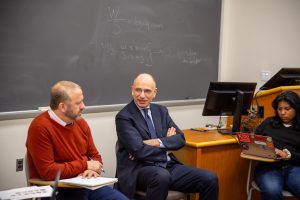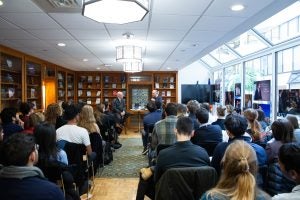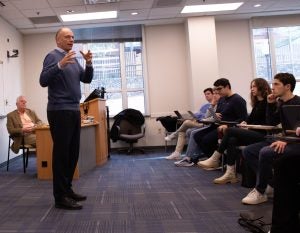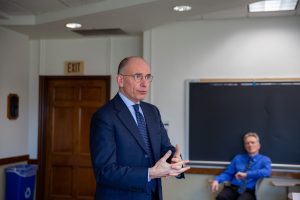This semester, former Italian prime minister and the European Union’s “single market czar” Enrico Letta joins the SFS as the Anne Dias Distinguished Visiting Fellow in Euro-American Affairs. A life-long politician and academic, Letta most recently served as leader of the Italian Democratic Party from 2021 to 2023. His current research, commissioned by the EU, explores policies for optimizing the single market, and he will present his findings to EU leaders in the spring. Along with his EU research, he is president of the Jacques Delors Institute, a think tank that promotes European integration.
Since September 2023, Letta has been meeting with leaders across Europe to develop recommendations on the European Union’s cornerstone: the single market. Since its creation in the 1980s, the global market has changed drastically. Originally intended to help regulate competition within the Union, the EU now competes with rapidly growing economies around the world that outpace Europe. In his capacity as EU rapporteur on the future of the single market, Letta aims to understand how to develop a more global vision for the European economy as it weathers the transition from internal to external competition.

“The key point for me is we have to integrate more. European countries, they have to integrate more, we have to eliminate barriers, and we have to create on many subjects a unique regulator, as we did with the Euro,” he says.
Beyond its economic rationale, Letta sees the single market as empowering individuals. Before the creation of the single market, in the 1970s, Letta moved to France with his family, though he was considered a foreigner. Nine years ago, when he once again moved to France (to lead the Paris School of International Affairs at Sciences Po), he enjoyed the benefits of citizenship. This shift in status allowed him to see the benefits of the single market. “I think it’s a sense of freedom, of liberty, that is absolutely unique, it’s the strength of the European idea, the single market,” he says.
Shared Challenges Across the Atlantic
While Letta has traveled across Europe in his research on the single market, he hopes his time at Georgetown will expose him to innovative ways of thinking about the market. Though the single market is foreign to the United States, both the EU and U.S. share some challenges, whether it be green industry or industrial subsidies. “I thought that it would have been very good to have an American point of view on that, and also a very interesting possibility to have meetings with American authorities because there are topics on the future of the single market that are related to the U.S., for instance, foreign trade or artificial intelligence,” he says.

In learning from the U.S. approach to these topics, Letta intends to meet with government officials, academics, and students alike. On his first trip to Georgetown in January 2024, Letta met with faculty and students from the Center for German and European Studies, and he began his visit by sitting down for a Coffee Chat on January 18 with SFS Dean Joel Hellman and students. During the chat, he answered a wide variety of student questions on the issues facing the EU, including the Eurozone, population retention, and demographic shifts in European countries.
“I was really impressed by the quality of the questions, and it would have been possible to stay three hours instead of one hour because of the number of questions and I was really very happy,” Letta says. On his subsequent visit in February, Letta engaged with students in office hours and a number of SFS classes, where he lectured on European competitiveness and economic diplomacy.
Turning to the Next Generation
Letta’s time at Georgetown won’t be his first experience in academia—for six years, he was dean of the Paris School of International Affairs at Sciences Po, a time that presented both new challenges and new opportunities.

“I have no doubt today that it [was] the best period in my life—the best professional period in my life and the best ever period in my life. First of all, because it is fantastic to have, every day, the possibility to exchange with students. And you are obliged to be always up to date, to use momentum. You are always full of challenges. You are always challenged,” he explains. “Sciences Po, like Georgetown, is a very international and a very cosmopolitan environment. So for me, it was fantastic to live with Chinese students, American students, European students, African students.”
As the European population ages, Letta finds that politicians must work more consciously with the younger generation to better understand their needs. “This is why, for me, this experience in Paris with the students was fantastic, also, to change my mind and reconsider the priorities,” he says.
Innovation Through International Cooperation
Georgetown’s commitment to supporting international cooperation was key in attracting Letta. “I think it’s a unique environment. They were interested because they are trying to, I would say, to raise the focus on Europe and on better and, I say, closer transatlantic link between Europe and [the] U.S.,” he says.

In particular, Letta believes that the American commitment to innovation and investment, combined with the more cautious European approach, can help both harness the power of new technologies like artificial intelligence. “I think if Europe and [the] U.S. stay together on these topics, the U.S. bringing innovation, Europe bringing wisdom, I think it’s a fantastic alliance,” he suggests.
Letta will visit Georgetown once more in the spring, where he will give a public lecture and continue to engage in dialogue with students and faculty on the future of the European Union.